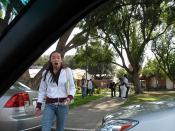ACT TWO, SCENE 1- line 111- 140.
In this particular part, Beatrice and Benedick are at a party, having a casual conversation about Benedick. Since everyone must wear a disguise to the party, there are naturally a few misidentifications. Ironically enough, Beatrice pretends not to know that Benedick is actually himself -as he is wearing a costume mask- and insults Benedick thoroughly. As she speaks to her dancing partner, she says that while Benedick thinks that he is witty others find him completely boring. Beatrice gets the better of Benedick while Benedick cannot defend himself. Dancing with him during the ball, while masked, she insults Benedick by mocking his "wittiness" and declaring his jokes boring. We see how hurtful her comments are when Benedick cannot stop repeating her words to himself later in the scene. Benedick hides his hurt and rage against this continuous volley of insults and later leaves the party.
Only starting from line 111 Beatrice and Benedicks conversation become the focus, as they had already previously been talking. Beatrice is a very intelligent and witty character in the play, she either doesn't realize its Benedick or most likely she wants to fool and upset him. Obviously, Benedick involves himself in this plot to understand what Beatrice thinks about him. This shows that times have not changed much, because still now, for instance in movies, there is this same interest, and conflict in plot; continual intrigued to find out information about oneself, no matter how the methods of achieving such information are. "He is the Prince's Jester, a very dull fool", Beatrice so bluntly states her opinion of him. I imagine when Benedick hears what Beatrice is saying, he tries to hold himself back and u can feel the fake ness when he says, "... ill tell him...


